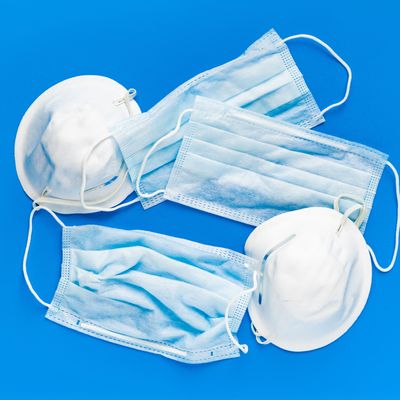
Hospitals and health-care providers are facing a shortage of personal protection equipment even as manufacturing resumes in China, where most health-care safety products are made. For almost two months, protective equipment — gowns, face shields, gloves, N95 masks — were either not being manufactured in China because workers were under quarantine or not being exported because China was claiming the equipment for its own needs. But over the past week, China has slowly resumed exporting safety gear.
“Product is coming out of China now, but it’s only trickling compared to what we need,” said Sheshank Kamalapuram, president of Vanguard Sourcing, which imports masks and other equipment for health-care providers in the United States. “Manufacturing is back up to 80 to 85 percent in China, but it’s not coming to the U.S. as fast as we all hope and pray that it’s moving.”
The situation is dire, as hospitals, nursing homes, and health-care centers are blowing through their supplies long before hospital admissions for coronavirus are expected to spike. Previously, the Department of Health and Human Services estimated that the U.S. would need some 3.5 billion masks if the virus reached pandemic level, which it has. Kamalapuram supplies one of the largest dialysis centers in the country, which he said is running low on masks. “It’s mostly elderly people who go to those facilities and if they are going once or twice a week, their lives are in danger,” he said.
According to Kamalapuram, there are a couple of reasons why the need hasn’t been met, despite China now producing some 200 million masks a day. The first is global demand — the United States isn’t the only country jockeying for masks, and N95 producers in countries like France and Germany have halted exports to meet their own needs. The second is cost. Normally, each mask costs about one or two cents; now each one costs 25 to 30 cents to make. The price jump isn’t necessarily because of price gougers. The mad dash has increased production costs, as companies in China add employees and expensive machinery, and flight restrictions put in place by the Trump administration to stem transmission of the virus make shipping protective supplies from China to the United States a challenge.
This week Michael Einhorn, the president of Dealmed, a Brooklyn-based medical supply manufacturer and distributor, is chartering a cargo plane to China to load with millions of dollars worth of supplies — including N95s, face shields, and isolation gowns, the thin, protective cloak frontline health-care workers wear — for about seven hospital systems. Some exporters have fudged paperwork, labeling N95s as simple dust masks to get past Chinese customs officials, but lately China has been loosening its grip on N95 exports. Still, Einhorn worries his cargo plane will have trouble returning to the United States. Many of the supplies are not approved for use in the U.S. despite meeting all of the specifications, but hospitals are so desperate for equipment that they will take whatever they can get. “If you don’t have hospital beds, you can figure out a different bed to put patients in,” Einhorn said. “But if you don’t have isolation gowns, patients are not getting treated.”
The problem, according to Einhorn, is that U.S. officials have not treated the issue with enough urgency and failed to communicate with distributors. “We’re not getting clear answers as to why we’re not getting products,” he said. “I wish the Trump administration would be more vocal about China. I wish it would prioritize getting commercial planes and military cargo planes to Shanghai and loading them up.”
To fill the N95 shortage, President Trump has urged construction companies to donate masks and demanded companies up their production levels. 3M has said it will produce 35 million more masks per month and Prestige Ameritech, one of the largest domestic manufacturers of respirators in the country, has promised to produce 1 million masks per day. But even that isn’t anywhere near enough to meet the enormous demand.
“One of the labs I work with uses over 1 million masks a week,” said Kamalapuram. “When you add hospitals, nursing homes, dentist offices, airports, and domestic consumption, it’s a lot. The only way we can get out of this situation is with China.”
Kamalapuram hopes officials in the United States and China can reach some sort of agreement to expedite N95s imports, but he suspects that will take months. In the meantime, there are other holes in the production chain he needs to fill. “The Malaysian government went into lockdown last night and most of the gloves used in hospitals come from Malaysia,” he said. “It’s one thing after another. It’s just a mess.”
We’re committed to keeping our readers informed.
We’ve removed our paywall from essential coronavirus news stories. Become a subscriber to support our journalists. Subscribe now.






























